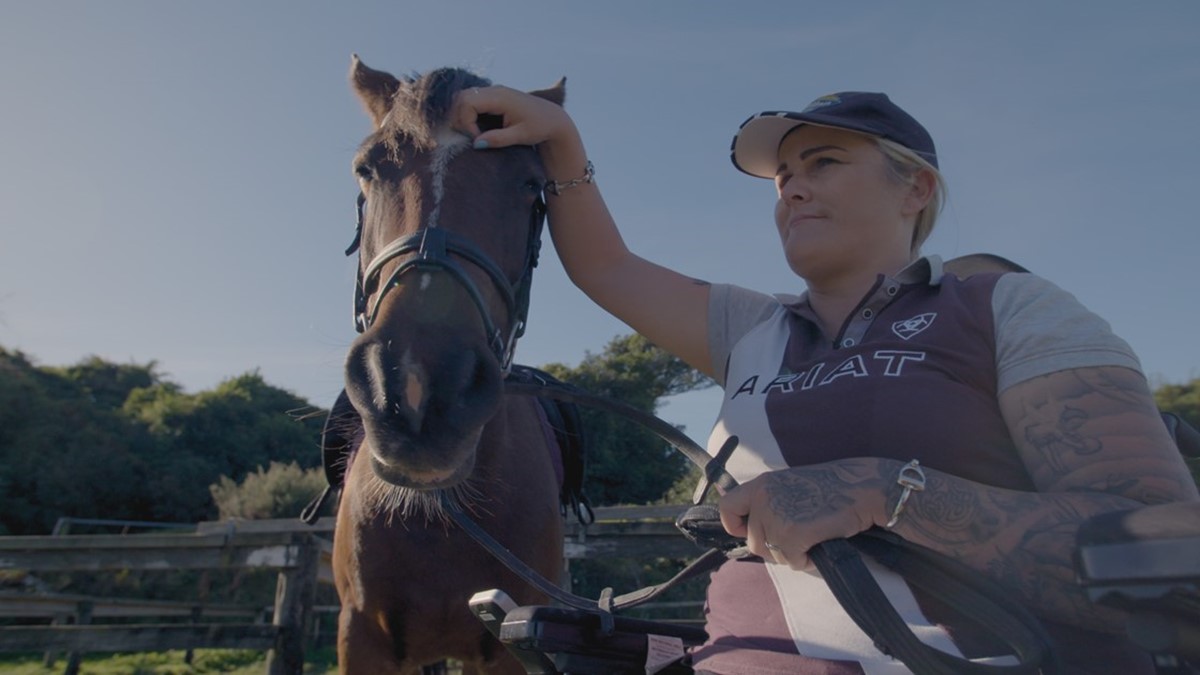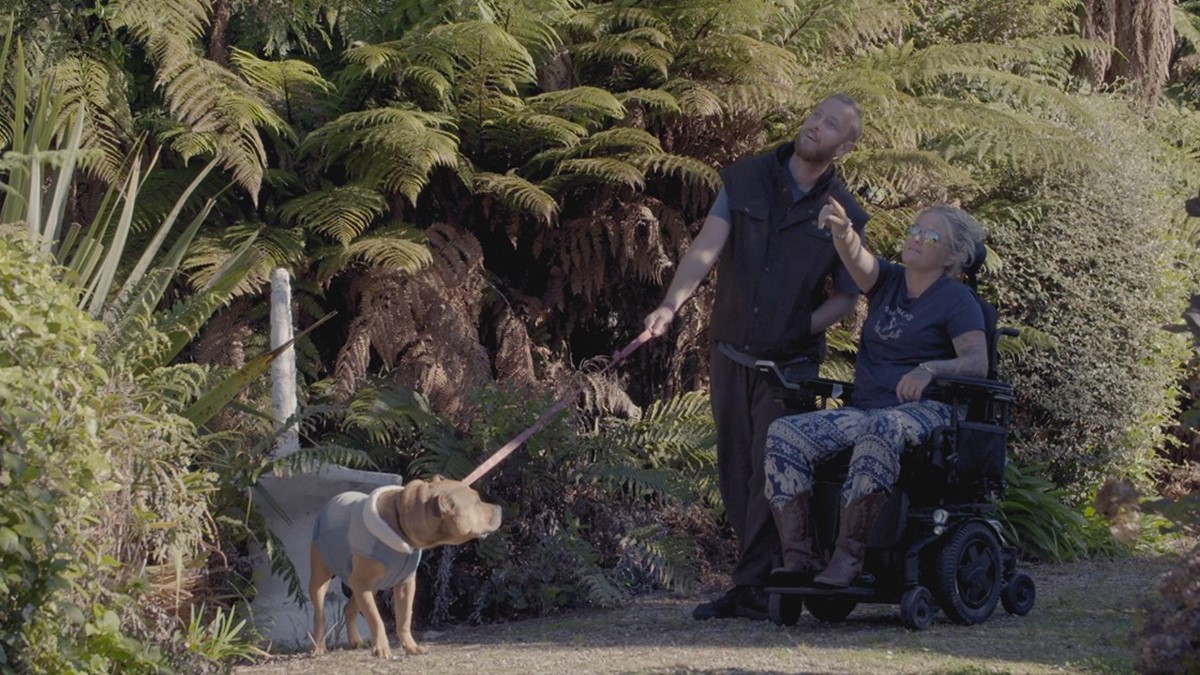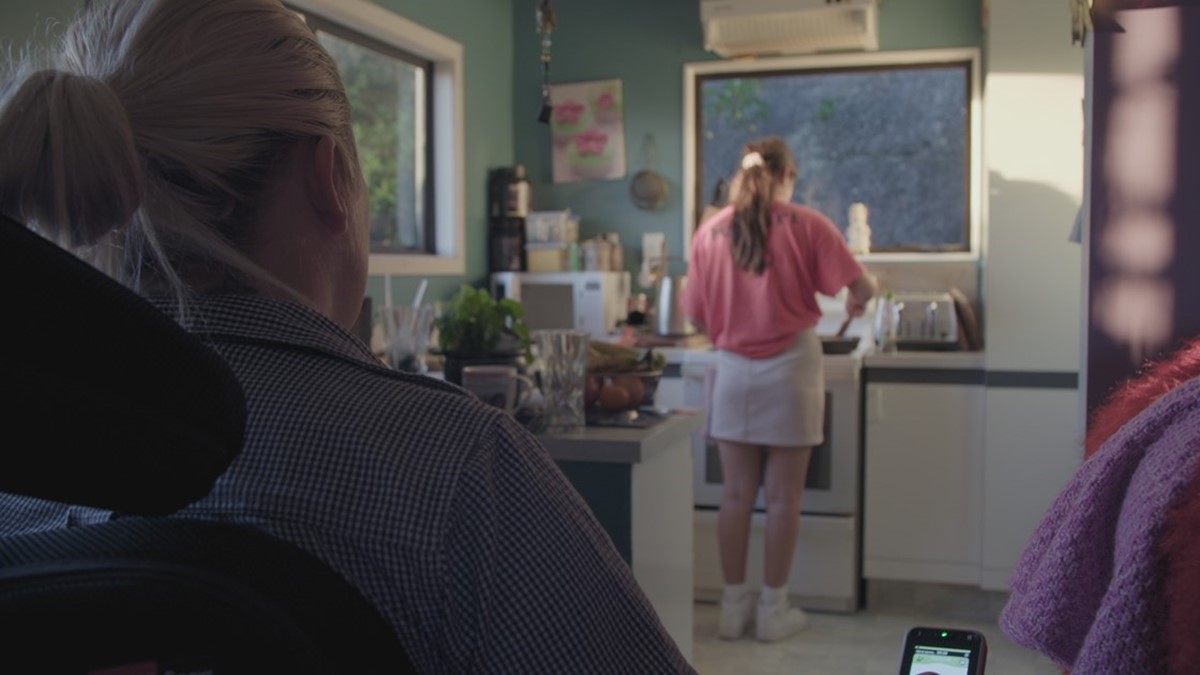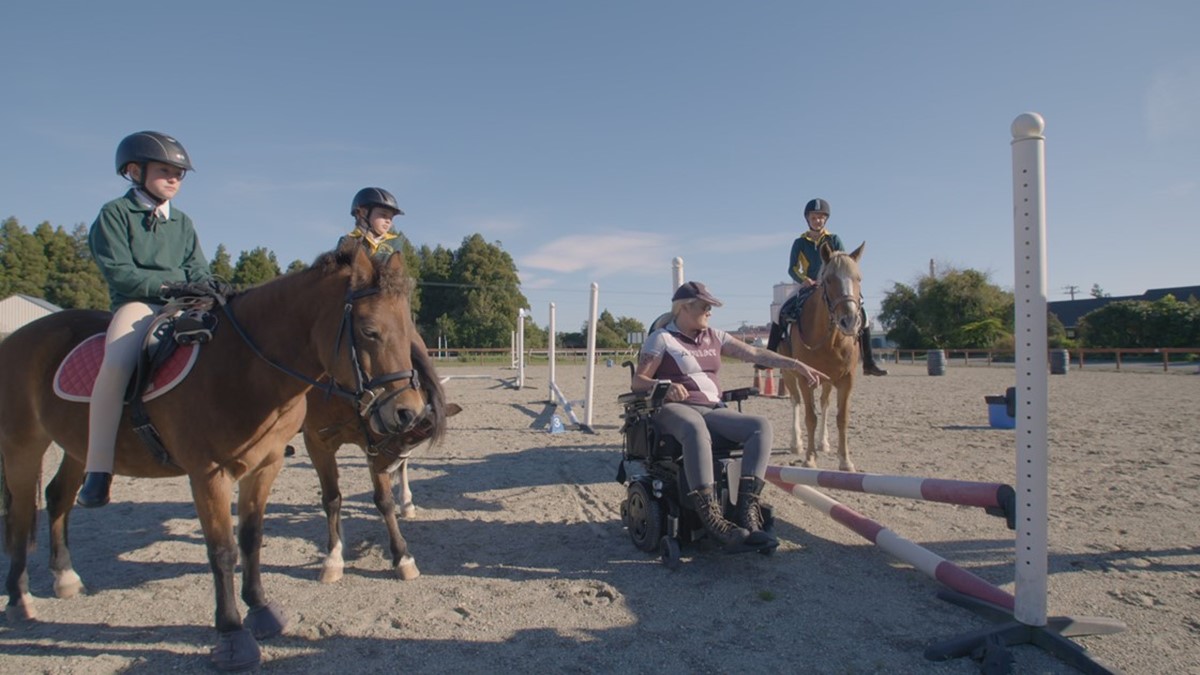
Being Me: Samarra
Samarra Wright grew up fearing she’d get MND - it killed her mother and many of her wider family. Here, the sassy West Coaster reveals how she lives with the disease that might also affect her two children.



Being Me: Sarah Morrell
Sarah Morrell has a rare genetic condition called Morquio IV which means she is just one metre tall....
Being Me: Sarah Morrell



Being Me: Te Huia Apaapa
26-year-old Te Huia Apaapa is a gifted runner and triathlete known as ‘The Rocketman’. Te Huia has a...
Being Me: Te Huia Apaapa



Being Me: Joshua Sade-Inia
Joshua Sade-Inia is a burns survivor who’s scars cover half of his body. To Josh they represent his ...
Being Me: Joshua Sade-Inia



Being Me
The quintessential Attitude episode. Being Me tells the story of remarkable individuals who face the...
Being Me



Being Me: Juanita Willems
Pre-Christmas Juanita Willems is flat out, collecting, wrapping and distributing presents for foste...
Being Me: Juanita Willems



Being Me: Bailee Lobb
Installation artist Bailee Lobb uses her colourful works to explore lived experience of disability, ...
Being Me: Bailee Lobb



Being Me: Geneva
Geneva Tino's cerebral palsy means she needs a TalkLink device to communicate... ironically the 24-y...
Being Me: Geneva



Being Me Alix
Alix Generous has spoken at the United Nations, made a significant contribution to science, given tw...
Being Me Alix



Being Me: Robbie
Robbie Francis is 27, and doing her bit to change the world. She's bringing together disability, sus...
Being Me: Robbie



Being Us: Andrey and Eilish
Best friends Andrey and Eilish are the Yin to each other's Yang and would be lost without one anothe...
Being Us: Andrey and Eilish



Being Me: Ian
Ian Stewart is a flamboyant 24-year-old with an eye for fashion, beauty and soap operas. But when dy...
Being Me: Ian



Being Me: Claire
Claire Freeman's achieved a lot since a spinal injury that put her in a wheelchair at 17, a design d...
Being Me: Claire



Being Me: Gigi
Gigi, a sassy girl with Down Syndrome from a small town America has a big dream - to walk the catwal...
Being Me: Gigi



Being Me: John
Sport has been a huge part of John Marrable’s life since an accident put him in a wheelchair. His ma...
Being Me: John



Being Me: Ripu
Ripu was 21, living in Sydney and finishing a Masters in Journalism when meningococcal septicaemia n...
Being Me: Ripu



Being Me: Heather
As Heather Lawson turns heads while walking the streets of Melbourne with her dressed-up walking can...
Being Me: Heather



Being Me: Cody Steps Up
Tetraplegia hasn’t stopped wheelchair rugby star Cody Everson from stepping up to adulthood. He owns...
Being Me: Cody Steps Up



Being Me: Jared Flitcroft
Jared Flitcroft is a filmmaker, businessman, family man, and he is Deaf. Overcoming barriers to achi...
Being Me: Jared Flitcroft



Being Me: Jason
Throughout childhood Jason Edgecombe was different and suffered endless rejection. But a diagnosis o...
Being Me: Jason



Being Me: Eamon
32-year-old Eamon Wood has travelled all over the world in his wheelchair. Now he’s back home in Chr...
Being Me: Eamon



Being Me Nick
Nick Chisholm is a body builder whose body is paralysed, a talker who spells words out with his eyes...
Being Me Nick



Being Me: Devon Briggs
Para-athlete Devon Briggs was born with severe clubfeet, twisted backwards. The 18-year-old has end...
Being Me: Devon Briggs



Being Me: Marfan Syndrome
Over 6 feet tall at just 13 years old, Milly manages the rare condition Marfan Syndrome, while griev...
Being Me: Marfan Syndrome



Being Me: Brent Eyskens
Unable to communicate verbally, songwriter Brent Eyskens - who lives with Cerebral Palsy - has found...
Being Me: Brent Eyskens



Being Me Rex
Rhys Davies was a successful I.T. engineer before a head injury changed life dramatically. He's not ...
Being Me Rex



Being Me: Kiranjit Singh
Tetraplegic, Kiranjit Singh, is competing to qualify for the 2024 Paralympics in Para-sport shooting...
Being Me: Kiranjit Singh



Being Me: Dillon Maydon
Dillon's life was altered at just eighteen when he was diagnosed with Friedreich’s Ataxia, a rare ge...
Being Me: Dillon Maydon



Being Me: Cyrus
Resourceful 13-year-old Cyrus, who lives with Cerebral Palsy, wanted an accessible swing in the park...
Being Me: Cyrus



Being Me: Sam Smith
Sam Smith is a comedian and a new dad. He doesn't take life too seriously but he's just been diagnos...
Being Me: Sam Smith



Being Me: Rachael Leahcar
Australian singer-songwriter, Rachael Leahcar, was born with retinitis pigmentosa and at 25-years-ol...
Being Me: Rachael Leahcar



Being Me: Eltje
Eltje lived for cycling and competing. While out training, she was struck by a car and suffered a tr...
Being Me: Eltje



Being Us: Nathan and Michael
A friendship born out of a love for sport, Nathan and Michael's fates aligned thanks to their passio...
Being Us: Nathan and Michael



Being Me: Lusi
Groundbreaking performer Lusi Faiva reconnects with her Samoan heritage as she makes her mark on Wel...
Being Me: Lusi



Being Me Freedom
Freedom was diagnosed with eye cancer at three months old, having both eyes removed by age five. Now...
Being Me Freedom



Being Me: Danielle Aitchison
Danielle Aitchison was born with Cerebral Palsy. As a child she struggled to walk, but her family en...
Being Me: Danielle Aitchison



Being Me Shakti
Shakti Krishnan is leaving his family to pursue tertiary life in the big smoke, and to prove to his ...
Being Me Shakti



Being Me: Aidan Terpstra
Aidan’s life changed forever when he was knocked out with a king-hit punch. The injury to his brain ...
Being Me: Aidan Terpstra



Being Me Sam
Sam Humphrey is the height of your average 7-year old. Except that he's not 7 - he's 22. However Sam...
Being Me Sam



Being Me: Veronique Theberge
Five years on from an acquired brain injury due to encephalitis, Veronique Theberge is training for ...
Being Me: Veronique Theberge



Being Me: Brylee
At six, Brylee Mills lost her arm, and has been coming to terms with it ever since. She's embarking ...
Being Me: Brylee



Being Me: Carlos
Carlos Biggeman is an award-winning photographer, he’s about to publish a book of his work. He was b...
Being Me: Carlos



Being Me: Hayley
17-year-old double amputee, Haley Birch is breaking records. Having survived meningococcal disease, ...
Being Me: Hayley



Being Me: Josh Davies
26-year-old Josh Davies is a stand-up comedian trying to turn making people laugh into a full time l...
Being Me: Josh Davies



Being Me: Cory
Punk-rock frontman Cory Newman is creating big waves with his band. The award-winning 17-year-old, w...
Being Me: Cory



Being Me: Jono
At birth, Jono Nelson was given just 24 hours to live. Now the Timaru-based hand cyclist, who lives ...
Being Me: Jono



Being Me: Petra
When she was six Petra was diagnosed with cancer. She beat it - four times before she was sixteen. N...
Being Me: Petra



Being Us: Liam and Shane
Liam has Down Syndrome, and while technically Shane is teaching him life skills, Liam's the one who'...
Being Us: Liam and Shane



Being Me: Susan Williams 8/5/22
Non-binary performance artist Susan Williams adores theatre. Their latest show, Illegally Blind, is ...
Being Me: Susan Williams 8/5/22



Being Me: Steff Green
Author Steff Green writes full-time from her home in the Kaipara Harbour. Legally blind, Steff was o...
Being Me: Steff Green



Being Me: William
Diagnosed with autism spectrum disorder and anxiety as a child, 25-year-old William Luskie is now an...
Being Me: William



Being Me: Erica
Born with a rare condition that affects her outward appearance, Erica Perry proves it’s what’s on th...
Being Me: Erica



Being Me: Rachel Māia
Rachel Māia lives in constant pain, considering amputating her leg to reach new heights.
Being Me: Rachel Māia



Being Me: Barney Looks Back
Barney lost his hands and legs from meningitis as a baby. At 25, he looks back on the life lessons ...
Being Me: Barney Looks Back



Being Me: Samarra
Samarra Wright grew up fearing she’d get MND - it killed her mother and many of her wider family. H...
Being Me: Samarra



Being Me: Jack
At 18, Jack Brown made a decision that would put him in a wheelchair for life. Facing his new realit...
Being Me: Jack



Being Me: Sarah
Though born with CHARGE syndrome, 22-year-old Sarah Dalton doesn’t let it define her. She’s an avid ...
Being Me: Sarah



Being Me: Joshua
Joshua Sade-Inia is a burns survivor. The scars, which cover almost half his body represent his ins...
Being Me: Joshua



Being Me: Ming Ming
Blind since birth, Ming Ming has never let that stop him being involved in everything from cricket t...
Being Me: Ming Ming



Being Me: Kasem
13-year-old refugee Kasem lost his leg and much of his upper arm in a bomb attack in Syria, which al...
Being Me: Kasem
Samarra Wright-Scott was born into a family with a disease that takes control. Motor neurone disease (MND) claims the use of muscles and slowly takes the lives of people with the genetic condition.
36-year-old mum of two Samarra, describes it as; “sharing your body with a monster of a house guest that will not leave.”
When pregnant with her second child, Samarra found out her mother was a carrier of MND, which meant Samarra was likely to have it too.

She received the unwanted diagnosis late last year, “I knew it could strike me one day maybe in my fifties and I thought that wouldn’t be so bad, so being told you’re gonna die early at a younger age is pretty brutal,” she is now one of three people in her family who currently has MND.
Health professionals came to the resolution in late 2017 after Samarra reported her leg twitching, “I thought maybe I’ve strained something in the gym, and I started limping.” But it turned out to be MND, “after the diagnosis I cried and cried and I was just angry screaming, because I had so many plans for my life.”
Her husband, Matt, says it was quite jarring to discover his wife had the disease, “Samarra used to joke about it, so it was quite a shock and I didn’t want to believe it at first, I just wanted to believe she had a dodgy hip.”

Since the diagnosis her life has changed from being very active as a personal trainer and boxing coach, “when it strikes it basically turns your good neurons into bad neurons and kills them, mine started in my hip but eventually it will shut down the muscles around your lungs so you won’t be able to breathe. There’s nothing anyone can do.”
Life with MND is very different, “you’ve gotta be really careful you don’t fall over and hurt yourself, you fall really fast and you can’t always break that fall like you used to.”
Matt also has had to adapt and admits it is scary, “fear is always in the background, I fear for me and the kids and how we’re gonna cope without her, I fear for her.”

Samarra’s 16 year-old daughter Kaytee says she feels a lot of pressure but she's looking on the bright side, "She's taught us to live in the moment, because there's not going to be a lot of those moments in the future."
14 year-old Jimmy is very keen on his sports but Samarra says, “both of my kids have definitely had to grow up quite fast, since I’ve been sick my son has learned how to cook and now he’ll do washing.”
Samarra is relentlessly positive and has not given up her independence; “I’ve seen the bubbliest people get it [MND] and hide away in their room and I thought I don’t wanna be that person I’ve got a family and a ship to run.”

She dedicates a lot of her time to coaching at the local pony club, teaching the younger generation how to ride confidently and says, “it’s my happy place.”
Living in Hokitika, Samarra identifies herself as a ‘coaster,’ “someone who loves their home and is known for their kindness, I had my whole community pull together to help me fundraise for my [disabled] bathroom.”
“I have to be strong for the children, it’s a hell of a disease, if only we could get to the bottom of it it would be amazing.”
Raeoni Wright is Samarra’s Nan and she helps out with the family, she has nursed many branches of the family through MND, “I have to be strong for the children, it’s a hell of a disease, if only we could get to the bottom of it it would be amazing.”
Samarra wants people to get a genetic test to identify whether they have it and improve awareness. The goal is to notify the government of the problem so they know how many people are affected. Both her children have agreed to get tested once they turn 18.
While she does not know how much time she has left with her family she realises, “time and family and everything you love is so precious and we just take so much for granted, but you’ve gotta make the most of it.”



Being Me: Jack
At 18, Jack Brown made a decision that would put him in a wheelchair for life. Facing his new realit...
Being Me: Jack



Bulletproof: Jezza
A canyoning accident in Switzerland left Jezza Williams a tetraplegic. An adventurer at heart, just ...
Bulletproof: Jezza



What's Your Possibility? Rebecca Dubber
Rebecca is an accomplished Paralympian swimmer, with 4 medals over her career. Shakti and Rebecca ta...
What's Your Possibility? Rebecca Dubber



Question Time: Surviving Meningococcal
In our new series, we answer some of the commonly asked questions relating to disability. Thanks t...
Question Time: Surviving Meningococcal



Love Is Blind: Tim & Helen
Tim was a professional athlete with the Wheel Blacks and didn't want a girlfriend. But when Helen he...
Love Is Blind: Tim & Helen



Paralympic Highlights Day 01
Day one of the 2020 Tokyo Paralympics sees our athletes in the pool, on the cycling velodrome and on...
Paralympic Highlights Day 01



Paralympic Highlights Day 02
Powerhouse Sophoe Pascoe begins her gruelling campaign at the Tokyo 2020 Paralympic Games, with New ...
Paralympic Highlights Day 02



Paralympic Highlights Day 04
Lisa Adams throws a new Paralympic record for gold, Danielle Aitchison qualifies for her sprint fina...
Paralympic Highlights Day 04



Paralympic Highlights Day 05
The single kiwi performance on day five ends in a silver medal with a superb performance on the trac...
Paralympic Highlights Day 05



Being Me: Dillon Maydon
Dillon's life was altered at just eighteen when he was diagnosed with Friedreich’s Ataxia, a rare ge...
Being Me: Dillon Maydon



Being Me: Gabby Wright
Gabby Wright suffered an injury from a virus that attacked her spine, dashing her Silver Fern dreams...
Being Me: Gabby Wright



Bulletproof: Lee Warn Part 1
Lee Warn has never let the fact he is in a wheelchair slow him down. He is a wheelchair marathon ath...
Bulletproof: Lee Warn Part 1



Bulletproof: Lee Warn Part 2
Last time, wheelchair user Lee Warn joined ‘Team Motive’, Aotearoa’s first disability racing car tea...
Bulletproof: Lee Warn Part 2



Being Me: Claire Freeman
Claire Freeman has achieved a lot since a spinal injury made her a wheelchair user at 17. She has a ...
Being Me: Claire Freeman



Bulletproof: Bailley Unahi
Bailley Unahi was crushed when a balcony collapsed on her at an outdoor concert in Dunedin. Paralyse...
Bulletproof: Bailley Unahi
Watch, learn and be inspired
Get your favourite stories in your inbox.
Thank you for subscribing
You'll receive your first newsletter soon.
Sending...
{{ serverError }}


